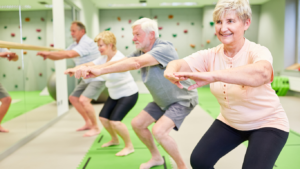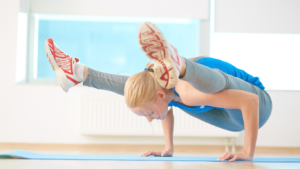
image of fitness ( by Robert kneschke on canva)
What are the skills of fitness?

Fitness encompasses a variety of skills that contribute to overall physical well-being. Let’s explore these essential fitness skills:
- Cardiovascular/Respiratory Endurance: The ability of the heart, lungs, and circulatory system to deliver oxygen to working muscles during prolonged exercise. Improving cardiovascular endurance can enhance overall stamina and reduce fatigue. This skill relates to the ability of your body’s systems to gather, process, and deliver oxygen. It’s crucial for activities that require sustained effort, such as running or swimming1.
- Stamina: Stamina refers to the capacity of your body systems to process, deliver, store, and utilize energy. It’s essential for enduring prolonged physical activities1.
- Muscular Strength: The amount of force a muscle or muscle group can exert against a resistance. Muscular strength is important for tasks such as lifting, pushing, and pulling heavy objects. Strength involves the ability of a muscular unit (or a combination of units) to apply force. Building strength through weightlifting or resistance training enhances overall physical capacity1.
- Flexibility: The range of motion available at a joint or group of joints. Flexibility is important for maintaining proper posture, preventing injuries, and performing movements with ease. Flexibility allows you to maximize the range of motion at a given joint. Regular stretching and mobility exercises improve flexibility1.

- Power: Power is the ability of a muscular unit (or a combination of units) to apply maximum force in minimum time. Explosive movements like jumping or sprinting rely on power1.
- Speed: The ability to move quickly from one point to another. Speed is important for sports and activities that require quick movements, such as sprinting or agility drills. Speed refers to minimizing the cycle time of a repeated movement. It’s crucial for activities that demand quick bursts of motion1.
- Coordination: The ability to move multiple body parts smoothly and efficiently. Coordination is important for activities that require precise movements, such as dancing or playing musical instruments. Coordination involves combining distinct movement patterns into a singular, fluid motion. It’s essential for precise and efficient movement1.
- Agility: The ability to change direction quickly and effectively. Agility is important for sports and activities that require quick changes in direction, such as basketball or soccer. Agility focuses on minimizing transition time from one movement pattern to another. It enhances responsiveness and adaptability during physical activities1.
- Balance: The ability to maintain stability and control of the body’s position. Balance is important for activities that require coordination and control, such as yoga or gymnastics. Balance is the ability to control the placement of your body’s center of gravity in relation to its support base. Good balance prevents falls and supports stability1.
- Accuracy: Accuracy relates to controlling movement in a specific direction or at a given intensity. It’s crucial for precise execution of tasks1.
In conclusion:
Remember, your overall fitness depends on competence in each of these ten skills. Whether through training or practice, developing these skills contributes to optimum physical competence and well-rounded fitness!



thanks
i never read this type of blog good.
usefull stuff thanks.
Your point of view caught my eye and was very interesting. Thanks. I have a question for you.